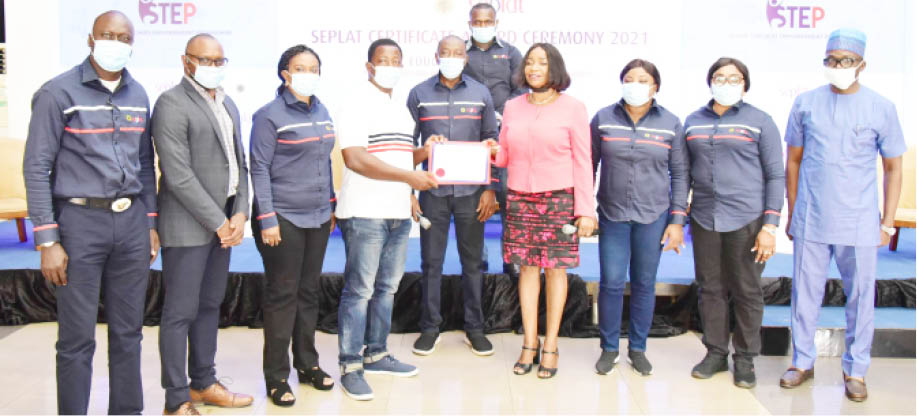The need to improve teachers’ creative thinking for quality education
Daily Trust gathered that most public school teachers have not enjoyed the privilege of undertaking any special training for long by government and that only a few have enjoyed the private sector and groups.

Participants at the SEPLAT Petroleum Development Company teachers training
In the quest to improve quality education and pupils’ attendance at the primary schools across the nation, experts sought the need to also improve teacher’s creative thinking through continuous on the job training and retraining.
Teachers training, despite its importance, have been relegated to the background and thus, one of the most challenging issues in the education sector.
- After 69 years, UCH delivers its first successful VIF
- FG inaugurates Police Public Complaints Committee
Daily Trust gathered that most public school teachers have not enjoyed the privilege of undertaking any special training for long by government and that only a few have enjoyed the private sector and groups.
A teacher with a government school in Abuja said there is a need for the government to train teachers to be up to date with global teaching and also asked for the engagement of more teachers to be able to deliver the needed quality education in Nigeria.
Report noted that in Gelegele Primary School, Edo State, there is higher pupils’ attendance, which has been associated with high achievements of many trained teachers. Yet, a teacher there said the school is in need of additional academic personnel and that capacity building of teachers will improve quality assurance.
Speaking on the state of education, a Professor of political economy and management expert, Prof. Pat Utomi said measures must be developed to boost teacher motivation adding that the impacts teachers make in the lives of students and community remain immeasurable.
According to Utomi, teachers need to continue to exhibit a strong passion for their profession with the undying commitment to sustaining the future generation adding that misery amongst the people could only be effectively addressed by quality education.
However, SEPLAT Petroleum Development Company Plc (SEPLAT) heeded the call and resolved to improve teacher’s creative thinking nationwide, allowing for higher student engagement, through its SEPLAT Teacher Empowerment Programme (STEP) unveiled in Benin City, Edo State, on November 23, 2020.
STEP is a six-month programme for teachers, which provides training on teaching applications for Science, Technology, Engineering, Arts and Mathematics (STEAM) as well as leadership and self-improvement training.
The programme is meant to help teachers incorporate multiple disciplines, and promote learning experiences that allow children to explore, question, research, discover and exercise innovative building skills.
According to the Director, External Affairs and Communications, SEPLAT, Dr. Chioma Nwachukwu, the company is determined to enhance the quality of education as part of its corporate social responsibility.
“With the STEP programme, the company now has programmes to address the entire education value chain. Our programmes now cover improving school infrastructure, enhancing the academic performance of students and building the skills of teachers,” Dr. Nwachukwu said.
She noted that a total of 100 teachers and 43 Chief Inspectors of Education (CIEs) drawn from Edo and Delta States are benefitting from this maiden edition.
She said after the first edition, the training continued online for six months with teachers receiving customised training modules on efficient pedagogical methods for STEAM education, as well as leadership and self-improvement sessions.
According to her, the company has developed an Online Teacher Resource Centre, which provides access to inclusive learning highlighting best techniques and practices for implementing STEAM teaching methods and assists teachers to learn to use such methods in the classrooms.
There is an E-Platform that connects teachers to a collection of STEAM resources to enable them to understand, teach and demonstrate effectively to their students.
Speaking on the programme, a teacher in Benin who does not want his name mentioned said through STEAM education, students are engaged in several activities in their daily life aimed at establishing communication skills like critiquing art, presenting research, collaborating with peers for group projects, and communicating results in research papers.
According to him, teachers who are well-equipped to teach STEAM, play an important role in guiding children, resulting in superior performance than less experienced teachers.
For Sola Okunkpolor, there is a need for a robust database in the educational sector to allow for good planning, monitoring and decision making.
She said, “Continuous data mining process is needed to enable us to know how many children are in school, how many are graduating, how many are progressive, how many are being engaged upon leaving school, and so on.”
Meanwhile, Dr. Nwachukwu said high numbers of out-of-school children, poor budgetary allocation to education and misplaced priorities are the significant setbacks that must be addressed for an improved standard of education.
“Worldwide, having a team of competent teachers is a critical success factor for achieving quality education. And while we look forward to more teachers and students being empowered through the programmes, here is a call on more organisations, corporate bodies, groups and well-meaning Nigerians to join in the drive to take Nigeria’s educational sector out of the doldrums and set it on albeit slow.”
